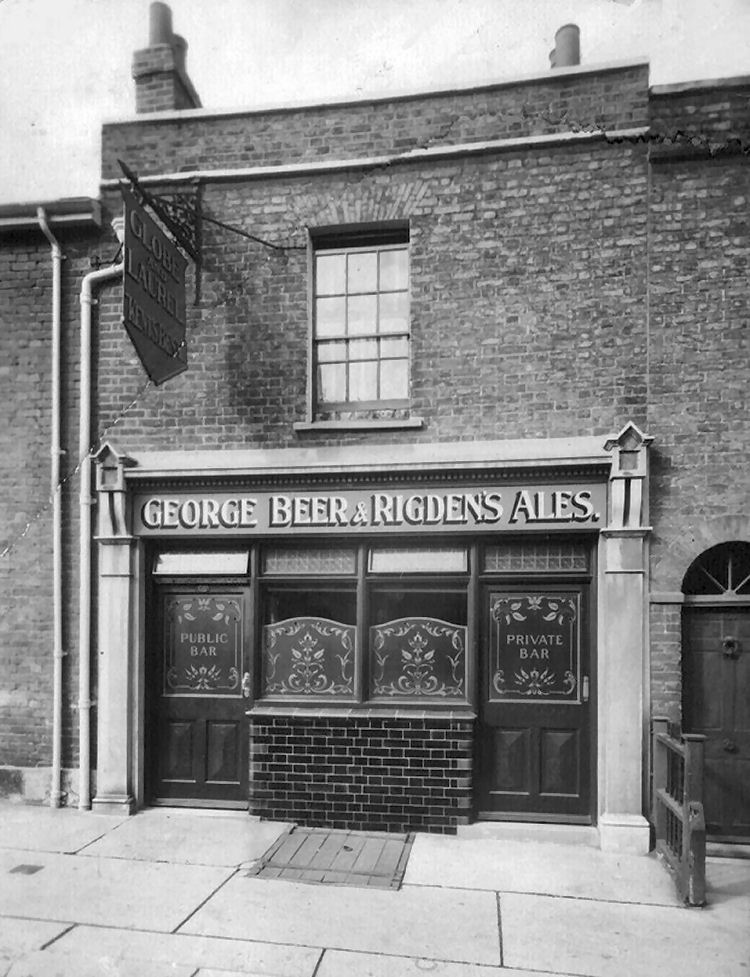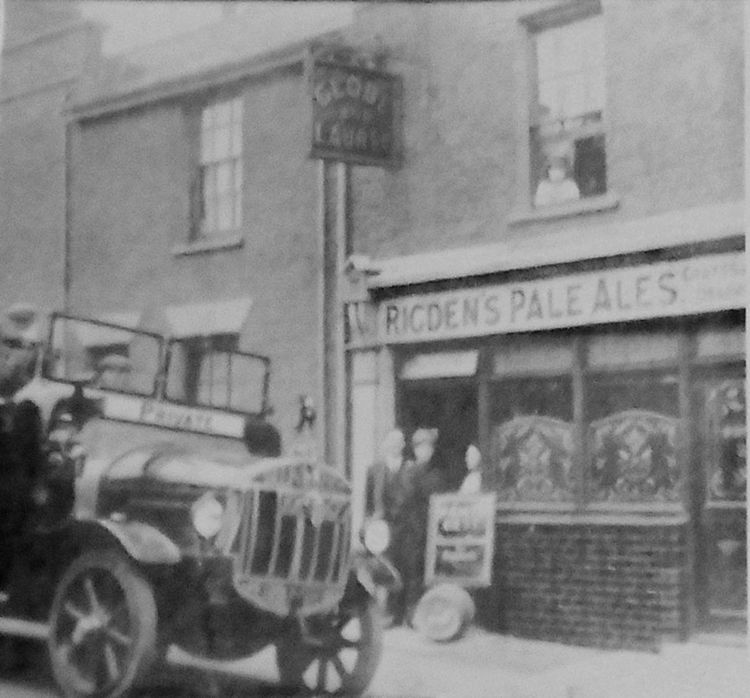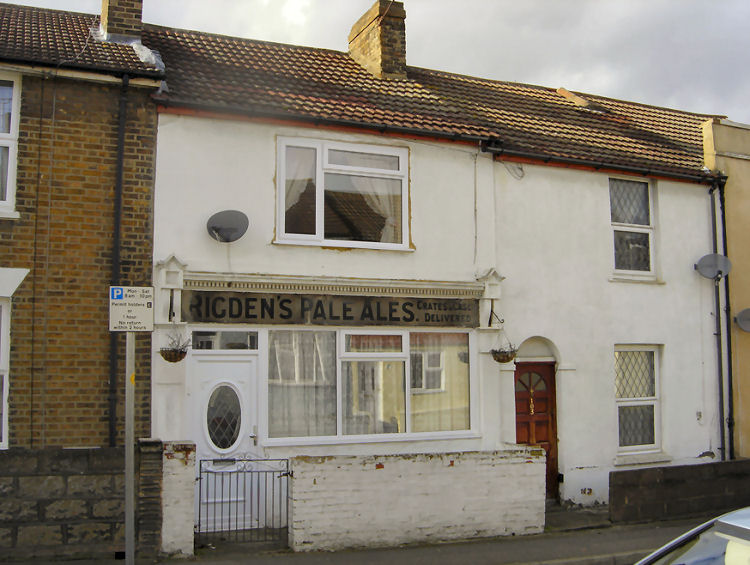|
105 Britton Street
Gillingham

Above photo circa 1927, kindly sent by Rory Kehoe. |

Above photo, date unknown. |

Above photo date 2011, from www.Flickr.com
by Ben Levick. |
|
Information from
https://www.flickr.com by Ben Levick
The "Globe and Laurel" takes its name from the Royal Marines Crest, not
surprising considering the nearby Royal Marines Barracks and Chatham
Dockyard. It had been in existence since at least 1860 and closed in
1973. The "Globe and Laurel" is a perfect example of the
many thousands of beer-houses that once dotted the country. Under the
1830 Beer Act, any householder who paid rates could apply, with a
one-off payment of two guineas, to sell beer or cider in his home
(usually the front parlour) and even brew his own on his premises. The
permission did not extend to the sale of spirits and fortified wines and
any beer house discovered selling those items was closed down and the
owner heavily fined. Beer houses were not permitted to open on Sundays.
The beer was usually served in jugs or dispensed directly from tapped
wooden barrels lying on a table in the corner of the room. Often profits
were so high the owners were able to buy the house next door to live in,
turning every room in their former home into bars and lounges for
customers. Within eight years of the Act there were about 46,000
Beer-houses opened across the country, far outnumbering the combined
total of long-established taverns, public houses, inns and hotels.
Because it was so easy to obtain permission and the profits could be
huge compared to the low cost of gaining permission, the number of beer
houses was continuing to rise and in some towns nearly every other house
in a street could be a beer house. Finally in 1869 the growth had to be
checked by magisterial control and new licensing laws were introduced.
Only then was the ease by which permission could be obtained reduced and
the licensing laws which operate today formulated. Although the
new licensing laws prevented any new beer houses from being created,
those already in existence were allowed to continue and many did not
fully die out until nearly the end of the 19th century. A very small
number remained into the 21st century. The vast majority of the old beer
houses applied for the new licences and became full public houses, or
closed down as time went by. These usually small establishments can
still be identified in many towns, seemingly oddly located in the middle
of otherwise terraced housing part way up a street, unlike purpose-built
pubs that are usually found on corners or road junctions. Many of
today's real ale micro-brewers in the UK started as home based Beer
House brewers under the 1830 Act. |
The 1851 census has the address as 7 Wellington Place.
|
Whitstable Times and Herne Bay Herald 02 April 1938.
DEATH OF FORMER KENT FOOTBALLER.
Much regret has been occasioned in the Medway Towns this week at the
news of the death, which took place in Lenham Sanatorium, on Sunday, of
Mr. Horace L Rowden, the licensee of the "Globe and Laurel," Britton
Street, Gillingham. He was only 37 years of age, but had been in failing
health for some time and was removed to the sanatorium a fortnight
before last Christmas.
Mr. Rowden - "Horrie " to his friends - hailed from Whitstable, and was
in the eye of Kent football in the years following the Great War, in the
balmy days of Chatham Football Club, when it was functioning in the old
Southern League.
Later, he played for Gillingham in the Third Division, also in the
centre-half position. He was a great asset to both Clubs, both from the
point of view of playing ability and personality, and was a warm
favourite with the football "fans" of the Medway district.
Mr. Rowden married Miss Reaks, the daughter of Mr. A. J. Reaks, a former
landlord of the "Globe and Laurel," a George Beer and Rigden house, and
on Mr. Reaks' retirement from business, took over the license. In
addition to the widow, a little daughter, Joan, is bereaved.
|
|
Dundee Evening Telegraph 28 March 1950.
OLD FAVOURITE.
Mrs. Potter, wife of the landlord of the "Globe and Laurel"
public-house, Gillingham, who was known to old-time music-hall audiences
as Queenie May, is to sing again.
She will appear at a benefit concert which friends are putting on for
her next month at Gravesend, where for 26 years she held the licence of
the "Iron Gate Inn."
Now 57, Queenie began her stage career at the age of Seven. She sang at
clubs and concerts in London.
Then one day a kindly Scottish gentleman, who had seen her perform, took
her to see a manager friend in his brougham.
She got a contract. Her benefactor was the late Sir Harry Lauder.
Queenie was on the stage until 1914 and appeared with all the great
names - Marie Lloyd, Kate Carney, the White-Eyed Kaffir, and Herbert
Campbell. She used to sing character songs such as "I'm waiting for the
old-age pension."
Now she is brushing up some of the old favourites for the concert.
|
I am informed that the premises closed between 1975 and 1980.
LICENSEE LIST
CHALKLEN George 1851+ (also Baker age 26 in 1881 ) )
PEARSON John 1881+ (widower age 49 in 1881 ) )
PEARSON John Duncan 1913+
ADAMS Albert 1918+
REAKS Arthur James 1922+
ROWDEN/BOWDEN Horace L to Apr/1938
 POTTER Mr 1950+
POTTER Mr 1950+
https://pubwiki.co.uk/GlobeLaurel.shtml
http://www.closedpubs.co.uk/globelaurel.html
|


